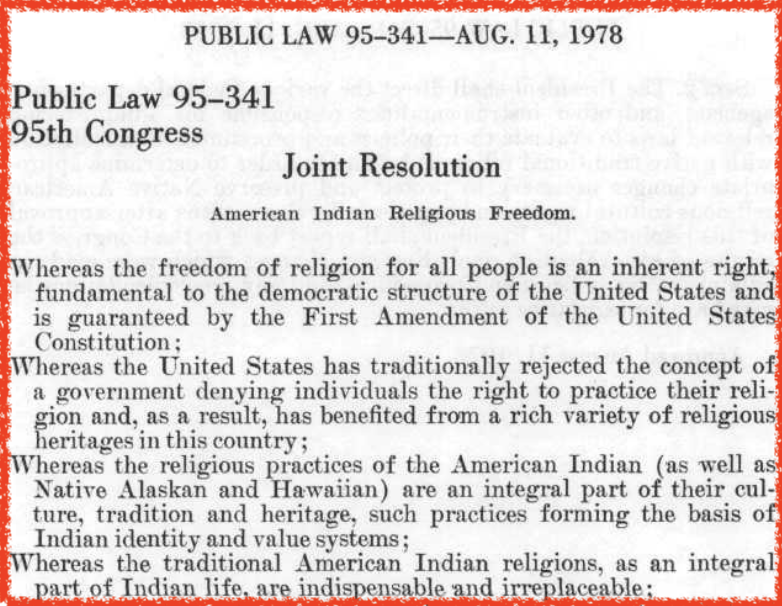
- Details
- By Neely Bardwell
On this day in history 44 years ago, the American Indian Religious Freedom Act (AIRFA), enacted by joint resolution of Congress, was signed into law by President Jimmy Carter.
“In the past, Government agencies and departments have on occasion denied Native Americans access to particular sites and interfered with religious practices and customs where such use conflicted with Federal regulations. In many instances, the Federal officials responsible for the enforcement of these regulations were unaware of the nature of traditional native religious practices and, consequently, of the degree to which their agencies interfered with such practices,” President Jimmy Carter said in a statement about the Act. “This legislation seeks to remedy this situation.”
Before AIRFA became law, many aspects of Indigenous culture were outlawed. Tribes were not able to practice sacred ceremonies, or pass teachings down to their younger generations.
Although the First Amendment in the United States Constitution protects the right to freedom of religion, the spiritual and religious rights of Native people were highly infringed upon. Laws that severely prohibited the practice of Native traditions and culture were direct attacks on their right to freedom of religion.
One of the issues AIRFA sought to rectify was the struggle to procure and use ceremonial feathers, specifically eagle feathers. Bald eagles were deemed an endangered species, which severely limited the access Natives had to them.
In 1979, an announcement by the Native American Rights Fund explained the importance of feathers.
“It is difficult for non-Indians to understand and accept the fact that Indians do attach religious importance to the use of feathers in certain rites; indeed, they are essential if the rite is to have any religious meaning for the Indian,” the NARF statement said.
Eight years later, President Bill Clinton signed an executive order which mandated that in managing federal lands, federal agencies must accommodate access to and use of sacred sites and must avoid adversely affecting such sites.
The law was then amended in 1994 to provide that “the use, possession, or transportation of peyote by an Indian for bona fide traditional ceremonial purposes in connection with the practice of a traditional Indian religion is lawful, and shall not be prohibited by the United States or by any State.”
To this day, the American Indian Religious Freedom Act is still in effect. This Act has allowed Tribes across the nation to practice sacred ceremonies and pass traditional teachings and traditions on for generations to come.
More Stories Like This
50 Years of Self-Determination: How a Landmark Act Empowered Tribal Sovereignty and Transformed Federal-Tribal RelationsGhosts Suppers - Part of Odawa Tradition and Culture Still Alive
The Celebration They Can’t Cancel: Native Heritage Month Lives On
United Indian Nations of Oklahoma to Hold Annual Meeting in Oklahoma City Nov. 6
Dakota Wicohan Receives 2025 Greater Minnesota Bush Prize for Dakota Language Revitalization
Help us tell the stories that could save Native languages and food traditions
At a critical moment for Indian Country, Native News Online is embarking on our most ambitious reporting project yet: "Cultivating Culture," a three-year investigation into two forces shaping Native community survival—food sovereignty and language revitalization.
The devastating impact of COVID-19 accelerated the loss of Native elders and with them, irreplaceable cultural knowledge. Yet across tribal communities, innovative leaders are fighting back, reclaiming traditional food systems and breathing new life into Native languages. These aren't just cultural preservation efforts—they're powerful pathways to community health, healing, and resilience.
Our dedicated reporting team will spend three years documenting these stories through on-the-ground reporting in 18 tribal communities, producing over 200 in-depth stories, 18 podcast episodes, and multimedia content that amplifies Indigenous voices. We'll show policymakers, funders, and allies how cultural restoration directly impacts physical and mental wellness while celebrating successful models of sovereignty and self-determination.
This isn't corporate media parachuting into Indian Country for a quick story. This is sustained, relationship-based journalism by Native reporters who understand these communities. It's "Warrior Journalism"—fearless reporting that serves the 5.5 million readers who depend on us for news that mainstream media often ignores.
We need your help right now. While we've secured partial funding, we're still $450,000 short of our three-year budget. Our immediate goal is $25,000 this month to keep this critical work moving forward—funding reporter salaries, travel to remote communities, photography, and the deep reporting these stories deserve.
Every dollar directly supports Indigenous journalists telling Indigenous stories. Whether it's $5 or $50, your contribution ensures these vital narratives of resilience, innovation, and hope don't disappear into silence.
 The stakes couldn't be higher. Native languages are being lost at an alarming rate. Food insecurity plagues many tribal communities. But solutions are emerging, and these stories need to be told.
The stakes couldn't be higher. Native languages are being lost at an alarming rate. Food insecurity plagues many tribal communities. But solutions are emerging, and these stories need to be told.
Support independent Native journalism. Fund the stories that matter.
Levi Rickert (Potawatomi), Editor & Publisher

